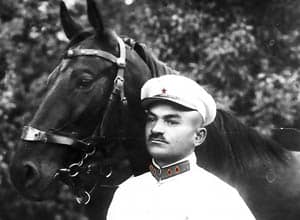Death of Hakob Melkumian (July 3, 1962)

Hakob Melkumian (Melkumov), a military officer in the Tsarist and the Bolshevik armies, fought in the First World War and the Russian Civil War, where he particularly distinguished himself fighting against the Basmachi movement on the Turkestan Front. He is known for commanding the unit that killed Enver Pasha, one of the executors of the Armenian Genocide, who had fled to Central Asia to command the Basmachi rebels.
Melkumian was born to a working-class Armenian family in the village of Kherkhan, near the city of Shushi, in Artsakh, on December 24, 1885. After the death of his father, he moved with his mother to Ashgabat (Turkmenistan), where his paternal uncle lived. Melkumian learned the Turkmen language and how to ride a horse. He graduated from the gymnasium of Ashgabat in 1906 and was drafted into the army in 1907. He was sent to study at the Nikolaev Cavalry School of St. Petersburg, from where he graduated with the rank of cavalry staff captain. During World War I, he commanded a machine-gun unit in the 4th Cavalry Division of the 6th Army Corps.
Melkumian joined the Bolshevik Party in 1918. He fought in battles from the first days of the Russian Civil War. In October 1918 he became commander of the 1st Moscow Cavalry Regiment in the 12th Division of the 8th Army of the Red Army and a year later, of a cavalry brigade in the 8th Army. In January 1920 he became commander of the 1st Cavalry Brigade of the 1st Turkestan Cavalry Division. He fought on the Turkestan Front between 1920 and 1923, becoming commander of the 2nd Cavalry Brigade of the 3rd Turkestan Cavalry Division. He participated in the defeat of Mohammed Alim Khan, Emir of Bukhara, and the capture of several cities in February 1921, for which he was awarded his first Order of the Red Banner.
In June 1922 he commanded the 2nd Turkestan Cavalry Brigade during the offensive of the Red Army against the forces of Enver Pasha, who had found refuge in Central Asia to lead the anti-Soviet Basmachi revolt and escape the avengers of the Nemesis Operation. Despite the significant numerical superiority of Enver’s detachments, they were defeated by units of the Red Army. According to Melkumian’s memoirs, Enver fled to the village of Chagan after being defeated in a battle near Baljuvon (modern-day Tajikistan) in August 1922. He was ambushed by a squadron of Red Army cavalry and killed by machine-gun fire outside the village mosque, although there are other versions of his death. Some sources write that Melkumian personally killed Enver Pasha with his saber, although he does not claim this in his memoirs. For his military achievements during the defeat of Enver Pasha’s army, Melkumian was awarded his second Order of the Red Banner.
From 1924 to 1926 he commanded the 8th Turkestan cavalry brigade. Then, on behalf of the Revolutionary Military Council, he formed the Turkestan National Cavalry Brigade and took over its command. Between 1926 and 1931 he participated in the defeat of the Basmachi rebels in Turkmenistan and Tajikistan as a division commander.
In 1934 he graduated from the Frunze Military Academy and became assistant commander of the Central Asian Military District in 1934-1937.
In November 1937, during the Great Purge, Melkumov was arrested on charges of participation in a purported anti-Soviet organization and sentenced to be shot in April 1940. However, after he appealed his sentence, the Military Collegium of the Supreme Court of the USSR commuted his sentence to fifteen years of imprisonment in a labor camp and five years of deprivation of his civil rights.
He was released from imprisonment in 1954, after Stalin’s death, and rehabilitated in 1955. His former rank of division general and all awards were restored. He lived the rest of his life in Moscow, where he died on July 3, 1962, and was buried in the Novodevichy cemetery. In 1960 he published his memoirs, titled “Turkestanians.” A monument was erected on his tomb, and another one was placed in his home village of Kherkhan, in Artsakh.
